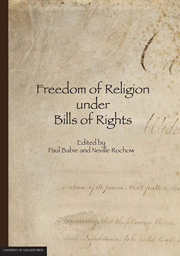Book contents
- Frontmatter
- Contents
- Acknowledgments
- List of Contributors
- Foreword by The Hon Sir Anthony Mason AC KBE: Human Rights and Courts
- INTRODUCTION
- SETTING THE SCENE
- 2 How Religion Constrains Law and the Idea of Choice
- 3 Is the Emperor Wearing the Wrong Clothes? Human Rights and Social Good in the Context of Australian Secularity: Theological Perspectives
- 4 Anniversary Overlap: Or What happens when St Paul Meets the Universal Declaration of Human Rights
- CONTEMPORARY FREEDOM OF RELIGION ISSUES
- COMPARATIVE EXPERIENCE WITH FREEDOM OF RELIGION
- TABLE OF LEGISLATION AND INTERNATIONAL INSTRUMENTS
- INDEX
3 - Is the Emperor Wearing the Wrong Clothes? Human Rights and Social Good in the Context of Australian Secularity: Theological Perspectives
from SETTING THE SCENE
Published online by Cambridge University Press: 05 June 2013
- Frontmatter
- Contents
- Acknowledgments
- List of Contributors
- Foreword by The Hon Sir Anthony Mason AC KBE: Human Rights and Courts
- INTRODUCTION
- SETTING THE SCENE
- 2 How Religion Constrains Law and the Idea of Choice
- 3 Is the Emperor Wearing the Wrong Clothes? Human Rights and Social Good in the Context of Australian Secularity: Theological Perspectives
- 4 Anniversary Overlap: Or What happens when St Paul Meets the Universal Declaration of Human Rights
- CONTEMPORARY FREEDOM OF RELIGION ISSUES
- COMPARATIVE EXPERIENCE WITH FREEDOM OF RELIGION
- TABLE OF LEGISLATION AND INTERNATIONAL INSTRUMENTS
- INDEX
Summary
This chapter suggests that a theological perspective born out of belonging to Jesus' kingdom, which he told Pilate was not of this world, might help us in understanding something about human flourishing and sociality in Australia. Such a perspective may provide some distance to help us to see that Australia has its own particular version of secularity and consequently an approach to sociality that is not entirely sympathetic to modern notions of human rights as a way of approaching human flourishing in society. Other ways exist to approach questions of fairness and human well-being in Australia. As with human rights regimes, those ways have not always been successful but in general the pattern has been more than notably defensible in the broad range of human societies. We clearly need to address failures. The question is, in what way? In this chapter I argue that working with the grain of the national story makes more sense than cutting across it.
The horrors of World War II created understandable revulsion among many and fuelled an interest in human rights as a strategy for dealing with abuse and corruption in human sociality. Theologians have responded in various ways to this movement. Nicholas Wolterstorff has tried to read back into the Hebrew Scriptures and the New Testament such notions of human rights, but he runs into significant tracts of this biblical material pointing in a different direction.
- Type
- Chapter
- Information
- Freedom of Religion under Bills of Rights , pp. 29 - 50Publisher: The University of Adelaide PressPrint publication year: 2012

